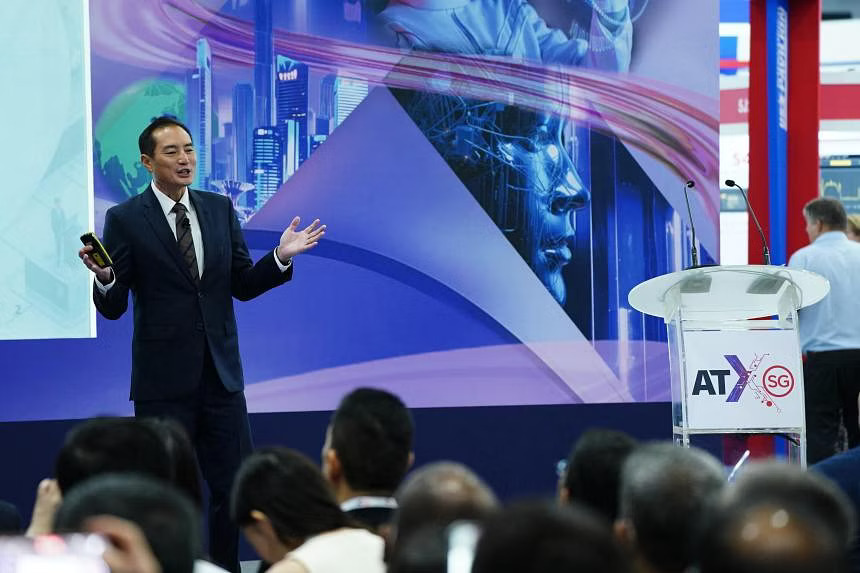SINGAPORE (ANN/THE STRAITS TIMES) – Under Singapore’s newly launched Digital Enterprise Blueprint (DEB), some 50,000 small and medium-sized enterprises (SMEs) are set to receive support in leveraging generative artificial intelligence (AI) tools.
The Singaporean government will subsidize up to 50 per cent of their tech expenses, including pre-approved AI tools, in a bid to advance Singapore’s digitalisation efforts.
Since the launch of the ChatGPT chatbot in late 2022, generative artificial intelligence (AI) tools have gained significant traction in various industries and applications.
This branch of AI, known for its ability to generate human-like text responses, has revolutionized customer service, content creation, and automation processes.
Announcing the five-year blueprint at the fourth run of ATxEnterprise on May 29, Senior Minister of State for Communications and Information (MCI) Tan Kiat How, the said: “After the COVID-19 pandemic, SMEs, especially younger-generation owners or management, want to use technology (in their businesses), but the challenge is they don’t know where to start.”
All pre-approved solutions under the existing SMEs Go Digital initiative will be AI-enabled where feasible, while all industry digital plans will be refreshed to incorporate AI-enabled solutions.

Under SMEs Go Digital, which was launched in 2017, the Infocomm Media Development Authority (IMDA) works with tech vendors to support digitalisation in SMEs. Digitalisation roadmaps for SMEs are developed across various sectors and have benefited more than 90,000 SMEs since the scheme’s launch.
The roadmaps provide SMEs with a step-by-step guide to identify suitable digital solutions and training programmes to equip employees with the right skill sets at each stage of their digitalisation journey.
For the broad base of SMEs, there is a curated list of about 400 pre-approved digital solutions, of which around 20 per cent are already AI-enabled, according to a joint report released by IMDA, MCI and the Cyber Security Agency of Singapore (CSA).
Agora CoLearning, an educational centre for children, is one SME that has benefited from AI solutions. The solutions have helped staff to correct reports and generate content for e-newsletters and e-mails.
The DEB folds all existing tech schemes under it. For instance, the blueprint includes an existing plan to train about 15,000 AI practitioners by placing them in the AI programmes that companies run.
A total of 18,000 tech professionals will be reskilled in AI and other in-demand tech domains.
The Singapore Computer Society (SCS) will continue working with IMDA to support training in areas that include AI by offering AI ethics and governance body of knowledge for the AI curriculum under the Information and Communications (I&C) Jobs Transformation Map steering committee.
Skills-based hiring is also encouraged by the Government for a better job fit. As at May 2024, more than 200 companies have pledged their support for skills-based hiring.
Christopher Tan, who is transitioning into a hybrid role of business analyst and developer at digital transformation firm Temus, was previously an optometrist in an optical retail shop for 15 years.
“Witnessing the resilience of tech-driven businesses during the pandemic while most other industries were affected made me look for ways to transition into a career in tech,” said Tan.
Temus’ programme, which helps individuals transition into tech roles without prior experience, equipped Tan with essential technical and soft skills to kick off his career as a junior full-stack developer.
Cyber security is another focus area under the blueprint. All SMEs have access to cyber-security health check tools, which have already been launched. Enterprises can use these tools to assess their cyber hygiene, benchmark themselves against their industry peers, and access resources to plug the required gaps.
There will also be established data protection and cyber-security standards for pre-approved solutions under SMEs Go Digital, which will especially benefit SMEs with no in-house cyber-security resources.
“Oftentimes, SMEs will tell us they need to scale (up) much faster, to seize market opportunities, not just in Singapore but overseas… It is not so easy to scale when you have a legacy system,” said Tan.
A legacy system is any outdated computing system, hardware or software that is still in use.
“And it’s much more (difficult) for small enterprises (to scale) without a very large IT team managing many of these complexities.
“SMEs adopting the pre-approved solutions have the assurance that over time, as they adopt more digital solutions, those solutions can work together and scale much faster, as the enterprises scale their businesses.”





